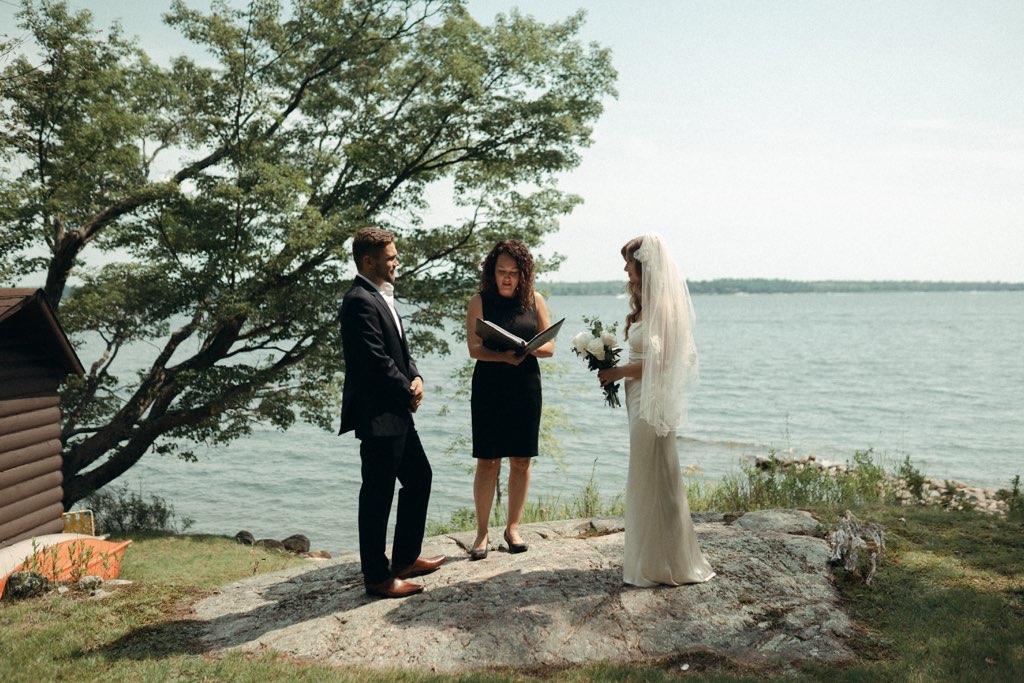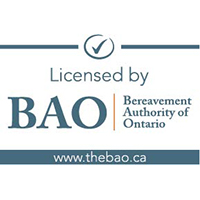
Photo by Andrei Barb
After officiating well over 500 funerals over the past several years, I was delighted to be the Celebrant for my first wedding ceremony a couple weeks ago. Three years ago, I was the Celebrant for Lizzie and her family as I helped them say goodbye to her father. Now she was asking for me to help her and her fiancé Chris to cross over the threshold from being engaged to being married. I was nervous, excited and overall so honoured and grateful for the opportunity.
Like with my funerals, I wanted to make the ceremony as personal and “so them” as possible. I spent a couple of hours getting to know them, how they met and what drew them together – first as good friends and then as both romantic and business partners.
Chris and Lizzie met in university. They had been together for 9 years, bought a house together, had a couple of cats and built a successful marketing company together. (Not to mention their fantastic individual YouTube businesses!) They had been engaged for 3 years and were hoping to be married last year. When the pandemic hit, the date was pushed forward a couple of times, each time with the hopes that restrictions would lift. In the end, they decided to have a small wedding at her family cottage up north in July. Next year they’ll have a bigger wedding so they can invite a lot more people who are important to them.
When I asked, “Why two weddings? Why not just wait until next year for the “big one”?”, I loved how Chris responded. He told me,
“I just don’t want to postpone it any more. I want to call Lizzie my wife.”
Chris and Lizzie knew they were committed to each other. They had been building a life together for over 9 years. Many common law couples say they don’t need the “piece of paper”, but for Chris and Lizzie, there was something about making their love official that was compelling them. A ceremony with their closest family and friends. A public sharing and witnessing of the sacred vows they’d written for each other. A celebration of making their love and commitment official through a meaningful wedding and “after-party”.
Of course for centuries, we humans have had ceremonies with weddings. We also have ceremonies to mark all kinds of graduations, athletic accomplishments, creativity and a wide variety of professional achievements. I think ceremony is a way that we say “This thing… this love, this achievement, this person… MATTERS to us. It is significant and worthy of our public acknowledgment and celebration TOGETHER.”
So no surprises for where I’m going with this.
It also applies to the importance of ceremony through funerals, memorials and celebrations of life.
I honestly don’t care what you call them. To me, it’s all semantics. The point is that when someone we love dies, it is so important to mark the occasion with ceremony. To say, “This person lived and they MATTERED to us. Whether they lived for 5 minutes or 100 years, their life impacted us and the world around them.” Of course their death is significant too. And ceremonies and rituals can remind us that their absence is also worthy of something that helps us begin to grieve together.
Sure, we may not see the funeral as “fun” as a wedding, graduation, or an Oscar or Grammy’s ceremony. There are a host of reasons for why people choose to skip the funeral including that they fear it may make them sadder than they already are.
But believe it or not, it’s been my experience many times that people want to applaud during a funeral because there’s such a celebratory feel in the room. I always say, “When I notice that people want to clap but seem hesitant, I always encourage it by clapping too. Why? Well what does applause often signify?
Gratitude.
And isn’t there so much to be grateful for that our person was part of this world.”
An old Swedish proverb tells us, “Joy shared is joy multiplied; sorrow shared is sorrow divided.” And whether at weddings, funerals or a host of other events, sharing these things in ceremony is one key way we can “make our love official”…both to those sitting around us and of course to the guest(s) of honour.





